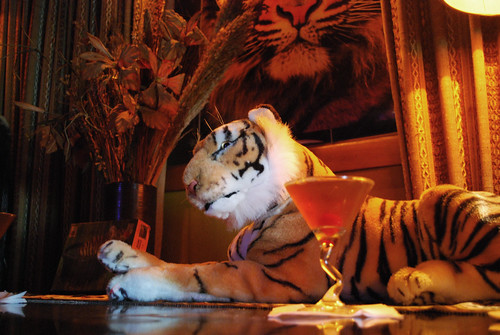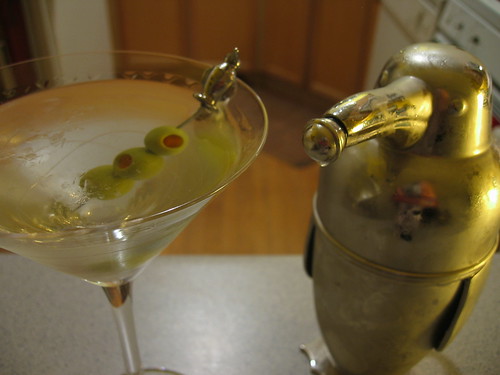
{Photos by rocketlass.}
From Richard Stark's Plunder Squad (1971)
Ducasse made himself a gin and tonic without ice. He held the glass up, grinning at it as thought it were a foolishness he'd somehow become saddled with, and said, "You know how I got onto this stuff?"Perhaps that was what the Shadow meant when he warned that the weed of crime bears bitter fruit.
The furniture tended to white imitation Italian Provincial. Parker sat in a chair with a comfortable back and uncomfortable arms and said, "No, I don't."
"Every time I'm in a hotel," Ducasse said, "sooner or later I'm in a conversation I don't want overheard. And that's when the ice runs out. In a motel, you just take the bucket and walk down to the machine, but in a place like this you've got to call room service. It takes half an hour, and in come a guy looks invariably like an undercover narcotics man. And everybody sits around not talking and not wanting their face seen. So I trained myself to drink this shit without ice." He took a swig and made a face. "It's like drinking iodine."
Still better, I suppose, than drinking something that tastes like licking paperclips, which is how a character in Charles Ardai's Fifty-to-One (2008) describes a gin and tonic she's served by an overbearing mobster. I begin to think I should add a new axiom to my collection: Never trust a mobster who serves bad gin. Post-Prohibition, that is--during Prohibition, I suppose even an otherwise sound mobster might reasonably on occasion have been reduced to serving a gin of less than Platonic form.
But yesterday's seventy-fifth anniversary of Repeal surely deserves that we take a more warmly appreciative tone. Geoffrey Gates gets us partway there with this line from his account of his first visit to a party thrown by George Plimpton, collected in the wonderfully fun and ridiculous George, Being George (2008):
This was what I'd been waiting for since college: this waft of conversation, liquor, perfume, smoke, and the exact noise level I've always liked.It's to Kingsley Amis's Lucky Jim (1954), however, that we should turn for a truly enthusiastic description of the art of imbibing:
In a moment he'd taken a bottle of port from among the sherry, beer, and cider which filled half a shelf inside. It was from this very bottle that Welch had, the previous evening, poured Dixon the smallest drink he'd ever been seriously offered. Some of the writing on the label was in a Romance language, but not all. Just right: not too British, and not too foreign either. The cork came out with a festive, Yule-tide pop which made him wish he had some nuts and raisins; he drank deeply. Some of the liquor coursed refreshingly down his chin and under his shirt-collar. The bottle had been about three-quarters full when he started, and was about three-quarters empty when he stopped. He thumped and clinked it back into position, wiped his mouth on the sideboard-runner, and, feeling really splendid, gained his bedroom without opposition.Which, with a certain sad inevitability, brings us to the next morning. Jim Dixon's hangover is epic, but in deference to those of you who may have over-indulged yesterday, we'll pass over it in silence, choosing instead to check in with Bertie Wooster--for Bertie, though he finds himself at the opening of The Code of the Woosters (1938) in similarly dire straits, has the incomparable Jeeves to see him through:
He shimmered out, and I sat up in bed with that rather unpleasant feeling you get sometimes that you're going to die in about five minutes. On the previous night, I had given a little dinner at the Drones to Gussie Fink-Nottle as a friendly send-off before his approaching nuptials with Madeline, only daughter of Sir Watkyn Bassett, CBE, and these things take their toll. Indeed, just before Jeeves came in, I had been dreaming that some bounder was driving spikes through my head--not just ordinary spikes, as used by Jael the wife of Heber, but red-hot ones.So here's to FDR, who not only got us out of a Depression, but forever drained the bathtub of gin as well, letting us once again enjoy the good stuff instead. Bottoms up.
He returned with the tissue-restorer. I loosed it down the hatch, and after undergoing the passing discomfort, unavoidable when you drink Jeeves's patent morning revivers, of having the top of the skull fly up to the ceiling and the eyes shoot out of their sockets and rebound from the opposite wall like racquet balls, felt better. It would have been overstating it to say that even now Bertram was back again in mid-season form, but I had at least slid into the convalescent class and was equal to a spot of conversation.
"Ha!" I said, retreiving the eyeballs and replacing them in position.

'Lucky Jim', one of my favourite books, has the best hangovers/morning-afters in literature. The scene with the blanket, the bedside table, the unfortunate cigarette and the razor blade gets me howling with laughter every time.
ReplyDelete